Engagement With Project ECHO to Increase Medication-Assisted Treatment in Rural Primary Care
Abstract
Objective:
The purpose of this study was to understand the barriers and facilitators that affect engagement with Project ECHO (Extension for Community Healthcare Outcomes) to implement medication-assisted treatment (MAT) in primary care settings.
Methods:
A 12-session weekly curriculum was delivered to participating primary care providers and clinic staff (N=24 participants from 13 clinics). Participants completed attendance logs and a qualitative interview in order to identify factors that influence engagement in the ECHO sessions and the potential integration of MAT.
Results:
Primary care providers and staff valued the ECHO sessions, but overall attendance was low and variable. Participants generally valued the didactic and interactive nature of the sessions but identified system-level constraints that limited engagement. Major barriers to participation included competing demands in patient care and the low degree of endorsement by clinic leadership.
Conclusions:
This brief report identifies key systematic challenges that may directly limit primary care providers’ engagement in telementoring models such as Project ECHO.




